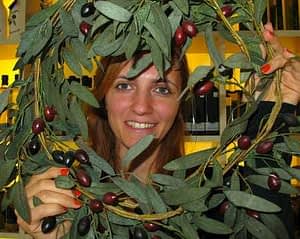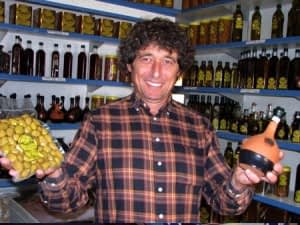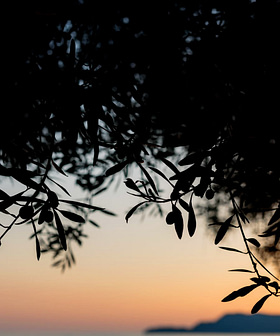By Byron Ayanoglu
Ayvalik, Turkey — This stunningly beautiful seaside town and its adjoining, timelessly relaxed Cunda/Alibey Island is a holiday destination with which to instantly fall in love. Ever more so at mealtimes because of its excellent local produce, shimmeringly fresh fish, the earthy yet light traditional cuisine, and most of all because of its native, extra-virgin olive oil.
That last reason goes without saying in Turkey, as Ayvalik is inseparable from the notion of olive oil, this being the home of the country’s best, fruitiest, smoothest, most golden-delicious version of the liquid condiment, which the nation eats at every single eating occasion of the day starting with breakfast.
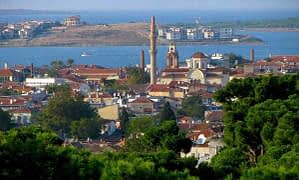 This area, on the north-eastern shores of the Aegean is equaled only by Crete and Tuscany for the ideal climate and just the right soil, just the right elevation on hills that rise directly from beaches. Under these conditions grow the most perfect Mediterranean olives to ripen for their pressing late in Fall, as they’ve been doing uninterruptedly for millenia.
This area, on the north-eastern shores of the Aegean is equaled only by Crete and Tuscany for the ideal climate and just the right soil, just the right elevation on hills that rise directly from beaches. Under these conditions grow the most perfect Mediterranean olives to ripen for their pressing late in Fall, as they’ve been doing uninterruptedly for millenia.
The life-giving green/purple little fruits have been cultivated here from times immemorial and crushed to yield their precious oil, used forever in all the finest aspects of civilized life, from sacred offerings, to cleansing the body and nourishing the skin, and of course on the table where its magical qualities can heighten even the humblest ingredient into a delicacy.
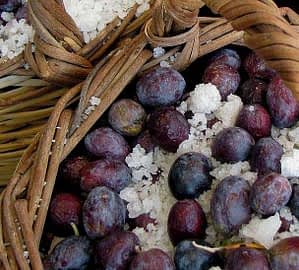 Ayvalik’s history was kick-started sometime in the Neolithic Age by migrants from Mesopotamia and Crete, and thrived throughout the Hellenistic period, the Roman conquests, the Byzantine era that peppered the landscape with Greek Orthodox churches, and then five hundred years of the Muslim Ottomans who replaced the crucifixes with minarets leaving the buildings intact wherein to worship the same One God from a different perspective.
Ayvalik’s history was kick-started sometime in the Neolithic Age by migrants from Mesopotamia and Crete, and thrived throughout the Hellenistic period, the Roman conquests, the Byzantine era that peppered the landscape with Greek Orthodox churches, and then five hundred years of the Muslim Ottomans who replaced the crucifixes with minarets leaving the buildings intact wherein to worship the same One God from a different perspective.
Only the olive oil has remained a constant during all these serial conquests and regime-changes, surviving intact to this day to shine virginal and free-flowing to the collective gullet of Modern Turkey. Perplexingly, and despite the world-wide rediscovery and worship of olive oil, the Ayvalik oil is known and consumed only in Turkey.
I ask Rahmi Gençer, executive chairman of the Ayvalik Chamber of Commerce, the reason for this and what is planned to rectify the situation.
His answer is redolent of the complications and difficulties of launching a new product in foreign markets. Determined attempts have been under way for years to enter the European market, now ever more restricted since the advent of the European Union and its protectionism in terms of subsidies offered to its own members, the titans of olive oil, Spain, Italy and (to a lesser degree) Greece.
Europe, he tells me, is not adverse to Turkish olive oil, it is just that it has become more expensive against the better known versions of its Mediterranean neighbours, and therefore a harder sell. Gençer calls Mustafa Cömert and Özer Uygun, two major oil wholesalers, into our meeting. They tell me that at least six thousand tons (seventy percent of which is extra-virgin) are produced annually, most of which is shipped in bulk sales to Italy, where it is blended with a tiny amount of local oil and packaged by the biggest exporters as Italian oil.
And that is how it arrives into North America even though no one is even remotely aware that they are buying Ayvalik oil when they purchase a medium-priced three-litre tin of major-brand “Italian” oil in the supermarkets.
This is an affront to civilization itself, and certainly to the human palate. Because, meanwhile, a sincere and tasteful effort is being made by everyone in the Ayvalik oil business to spiff-up presentation and quality to the standards of the best anywhere. There are some two hundred small independent producers (still not unified into a cooperative) who have opened boutiques where in jewelry store-like premises they present stylishly bottled oil for the tourists who flock here in summer.
I visit Ayvalik town’s Kürsat where Ayten Tavasoglu poses for us in front of a mirrored display case of Asuman Baygin’s hand-made, olive oil with a fruity aroma that can only be developed with tender loving care. And in adjacent Cunda Island, I marvel at both the fruity oil and the
mythically beautiful array of bottles at Kesebir’s shop where his
very own trapped sunshine awaits to enhance salads and grilled fish.
Hüseyin Kesebir himself, a weathered islander, like a handsome pirate from the old days, guides me through a gustatory tour of local olive-oil cookery. He takes me to his associate’s sea-front Lyra restaurant, where I sample artichokes that he grew himself, grilled on charcoal with olive oil and mountain-grown oregano its only adornments. This astoundingly simple and delicious starter is segued by the same artichokes stewed with veal, lemon and more olive oil. The ultra-fresh grilled fish made luxurious with its oily mantle, a true delicacy that seems almost like an after-thought, and arugula salad round out the meal, which ends with a small dessert cake of olive-oil crust around lor cheese (a local, sheep’s milk ricotta).
It is of course a great pity that Ayvalik’s wonderful olive oil and the cuisine which it occasioned can only be enjoyed in its home-base. On the other hand, it gives those who make the effort to visit the area an affordable and unforgettable treat.
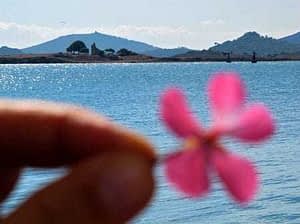 Everything about this region is to be cherished. The care-free
Everything about this region is to be cherished. The care-free
summers of sun and beach; the lush olive-groves of the countryside; the evocative and historically mysterious, near-by Bergama (Pergamon) with its ancient Acropolis and Asclepion where the old temples and carved columns still beckon the faithful to pay their respects to Zeus and to seek the panacea of sacred spring water that has been curing the ill since Hellenistic times; the vistas of embroidered coastline, especially if witnessed from the heights of the “Devil’s Table” (Seytan Sofrasi), where a 360 degree panorama literally takes the breath away.
And, to mention yet again, the fabulous food in just about every corner of both Ayvalik town and Cunda Island. I seek out a tiny place called Fasulye (Beans) where Muazzez Uludere Eris cooks up vegetarian olive-oil specials, obviously including her signature kidney-beans. Also inside Ayvalik, just a block up from the port, I have Strasbourg,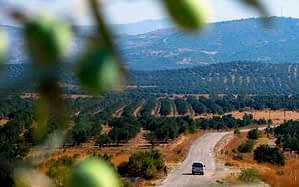 France inspired chocolate mousse pie by Yasemin Arbak at Café Caramel (as a diversion from local sweets like baklava and seker-paré). I return to Cunda for more grilled fish at Lyra, and an unusual, almost addictive pizza with stinging nettles (now cooked and unthreatening) and pastrami’s grand-daddy, the extra-pungent, locally cured pasturma, at Ismet Somay’s Pizza Uno.
France inspired chocolate mousse pie by Yasemin Arbak at Café Caramel (as a diversion from local sweets like baklava and seker-paré). I return to Cunda for more grilled fish at Lyra, and an unusual, almost addictive pizza with stinging nettles (now cooked and unthreatening) and pastrami’s grand-daddy, the extra-pungent, locally cured pasturma, at Ismet Somay’s Pizza Uno.
Its olive oil makes Ayvalik a grand location that we can enjoy wherever we live if they could only overcome the obstacles and bring it home to us.
.
Photos: Algis Kemezys


